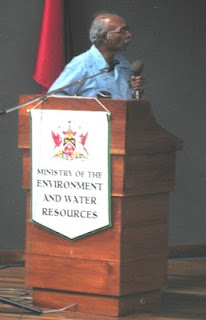On September 17th, 2014, the Multilateral Environmental Agreement Unit (MEAU) of the Ministry of the Environment and Water Resources (MEWR) held a Workshop with key stakeholders charged with assisting in the management of the country’s biological resources, and discharging the Government’s obligations under the Convention of Biological Diversity (CBD).
 |
|
Ms. Candace Amoroso chairing the Data Collection and Monitoring of National Biodiversity
Targets and Indicators Workshop in September, 2014.
|
The key stakeholders included representatives from the Central Statistical Office (CSO) of the Ministry of Planning and Sustainable Development, Fisheries, Agricultural Planning and Research Divisions and Aquaculture Unit of the Ministry of Food Production, the Environmental Management Authority, Forestry Division of the Ministry of the Environment and Water Resources as well as the Department of the Natural Resources and the Environment, Tobago House of Assembly.
Through a consultative process with key stakeholders held during the period April–June, 2014 draft National Biodiversity Targets and Indicators were developed. The Targets and Indicators will allow Trinidad and Tobago to more efficiently monitor the status of and guide management and conservation interventions of the country’s biological resources and as such would greatly contribute to the country in achieving the objectives of the CBD.
As a follow-up, the Workshop in September was undertaken to discuss and determine responsibilities for data collection and monitoring of the proposed draft National Biodiversity, which were previously refined via consultations with stakeholders in April– June, 2014.
The stakeholders were also informed that the finalised list of National Biodiversity Targets and Indicators along with the proposed list of data collectors were to be submitted to the Cabinet of the Republic of Trinidad and Tobago as the National Biodiversity Targets and Indicators of the country.
 |
|
Participants discussing and determining their roles in data collection and monitoring of
the proposed National Biodiversity targets and indicators.
|





